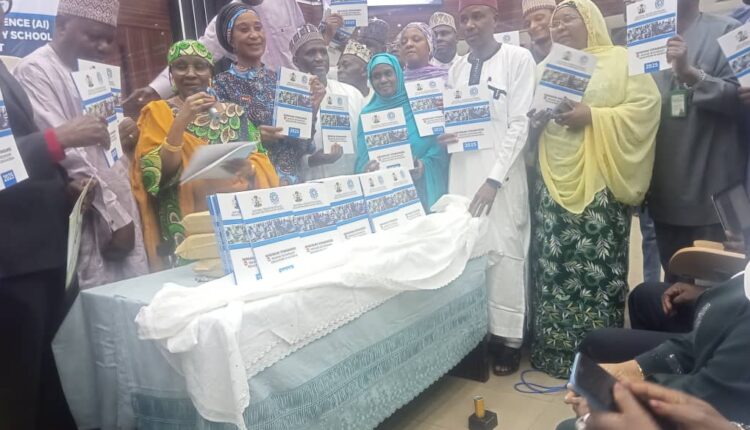The Federal Government of Nigeria has launched an Artificial Intelligence (AI) training programme to equip 6,000 selected senior secondary school teachers across the 36 States of the Federation and the Federal Capital Territory (FCT).
The initiative, organised by the National Senior Secondary Education Commission (NSSEC), seeks to integrate AI into the educational system, enhancing teaching methods and empowering educators with the skills to prepare students for a technology-driven future.
At the flag-off ceremony of the training, as well as the unveiling of the minimum standards for senior secondary education in Abuja on Tuesday, the Minister of Education, Dr. Maruf Olatunji Alausa, said the programme was a landmark in its collective commitment to equipping teachers with the skills necessary to prepare students for the rapidly evolving digital age.
“The world is undergoing a technological revolution, and Artificial Intelligence (AI) is at its core. AI is no longer a futuristic concept but a present-day reality, transforming industries, economies, and societies.
“As educators, we must embrace this evolution and ensure our education sector is not left behind. The integration of AI into pedagogy offers an unprecedented opportunity to enhance learning experiences, personalise education, and develop critical thinking skills among our students. Our goal is to prepare them for careers in a technology-driven world, where AI literacy will be as fundamental as reading and writing.
“This document, which was developed by NSSEC through extensive collaboration with stakeholders and approved by the National Council on Education, will serve as a guiding framework to ensure that senior secondary education across Nigeria adheres to high-quality standards. It is our blueprint for ensuring consistency, accountability, and measurable improvement in our education sector.”
Minister of State for Education, Professor Suwaiba Said Ahmed, said the world was moving rapidly towards a digital future, and Nigeria must not be left behind.
According to her, the introduction of AI into Nigeria’s education system will enhance both teaching methodologies and learning experiences, ensuring that students are better prepared for global opportunities.
The Minister, who was represented by the aide to the Minister of State on Technical Matters, Dr. Clara Ujam, said the Ministry of Education, under the administration of President Bola Tinubu, has placed a high premium on education reforms aimed at ensuring Nigerian students are equipped with 21st-century skills.
“The AI in Pedagogy training is a vital component of these reforms, ensuring our teachers acquire the necessary skills to facilitate innovative and technologically-driven education.
“To our dedicated teachers, you are at the center of this transformation. The knowledge and expertise you acquire through this training will have a ripple effect on our students, preparing them for a world where digital and AI skills are indispensable. I encourage you to embrace this opportunity fully and apply the knowledge gained to enrich classroom experiences,” Ujam stated.
Also speaking, the executive secretary of NSEEC, Dr. Iyela Ajayi, said the official unveiling of the Developed Minimum Standards for Senior Secondary Education and flag-off of an online Google-sponsored AI in Pedagogy training of 6,000 Senior Secondary School Teachers across the country marked a pivotal moment in the pursuit of excellence in education, bearing in mind the Renewed Hope Agenda on our nation’s education system.
“As we embark on this journey of national renewal under the visionary leadership of Mr. President Bola Ahmed Tinubu, we must recognize that education is not merely a tool for individual advancement, but the cornerstone of a prosperous and equitable society.
“What we are about to witness today is a reflection of our collective commitment to excellence, equity, and relevance in our senior secondary education system. As we all know, education is the bedrock of any progressive society, and the senior secondary level plays a pivotal role in shaping the future of our young ones, preparing them for higher education, employment, and lifelong skills.
“The Virtual training programme, which is sponsored by Google Research and supported by Data Science Nigeria and Olabisi Onabanjo University Ogun State, is aimed at enhancing the AI pedagogical skills among senior secondary school teachers across the 36 states and the FCT. The training is packaged in five modules and is expected to run for a period of five weeks.
“On the other hand, the National Senior Secondary Education Commission, entrusted with the crucial responsibility of repositioning the Senior Secondary Education, provides intervention in the area of capacity building of teachers, provision of instructional resources, among others, and has developed Minimum Standards for Senior Secondary Education in Nigeria,” she stated.
LEADERSHIP reports that key features of the Minimum Standards are curriculum and learning outcomes, ensuring that all learners acquire essential knowledge, skills, and competencies required for higher education and the workforce.
Others are teacher qualifications and professional development, infrastructure and learning environment, quality assurance through a robust monitoring and evaluation system, school governance and leadership: promoting accountability, effective management, and community engagement in school administration, planning research and statistics, and implementation and stakeholder commitment.
He called on state governments, school administrators, and private sector partners to support this initiative by investing in infrastructure, teacher training, and learner welfare.
Ajayi further said schools have been given a period of nine months to implement the minimum standards.
We’ve got the edge. Get real-time reports, breaking scoops, and exclusive angles delivered straight to your phone. Don’t settle for stale news. Join LEADERSHIP NEWS on WhatsApp for 24/7 updates →

